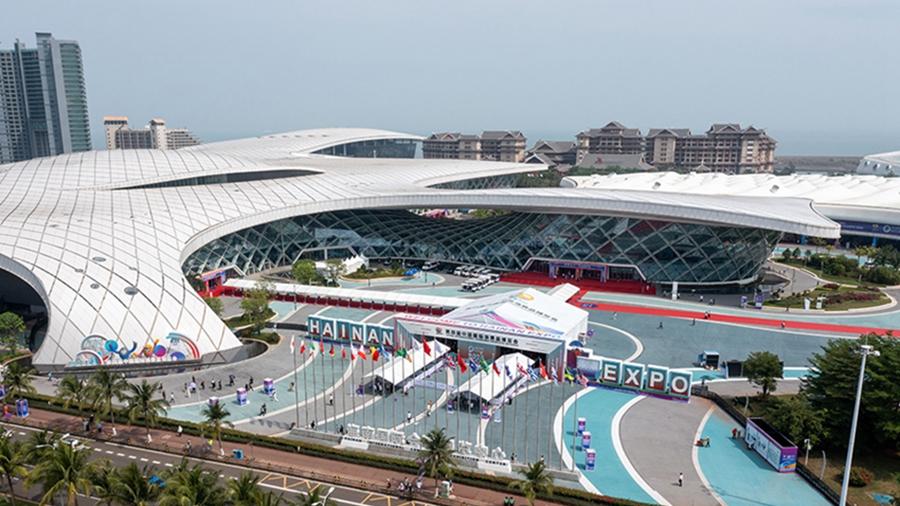WEF calls for global cooperation, warning trade barriers serve no-one's interest

This photo taken on Jan. 20, 2025 shows the logo of the World Economic Forum (WEF) in Davos, Switzerland. (Xinhua/Lian Yi)
This year's forum emphasizes the urgent need for an open and inclusive global economy, along with strengthened international cooperation.
DAVOS, Switzerland, Jan. 23 (Xinhua) -- Amid unprecedented global uncertainty and rising protectionism, the ongoing World Economic Forum (WEF) annual meeting has emphasized the urgent need for an open, inclusive global economy and strengthened international cooperation to address economic challenges and ensure a sustainable recovery.
WEAK RECOVERY
The global economy is poised for another year of uncertainty and uneven growth, according to the WEF's latest Chief Economists Outlook, which was launched ahead of the annual meeting that is themed "Collaboration for the Intelligent Age" this year.
The outlook said 56 percent of surveyed chief economists expected the global economy to weaken in 2025, compared to only 17 percent anticipating improvement. In addition, key discussions at the annual meeting were dominated by phrases such as "extremely high uncertainty" and "at a crossroads."
The International Monetary Fund (IMF) released an update to its global outlook on Jan. 17, projecting global economic growth at 3.3 percent both in 2025 and 2026. However, the figure is below the average annual growth rate of 3.7 percent from 2000 to 2019.

People attend the World Economic Forum (WEF) in Davos, Switzerland, Jan. 20, 2025. (Xinhua/Lian Yi)
GLOBAL SOLUTION FOR GLOBAL PROBLEMS
The escalation of geopolitical conflicts and regional instability have brought the level of global cooperation to a low point, according to the Global Cooperation Barometer 2025 report released by the WEF on Jan. 7.
Speaking at the WEF annual meeting on Tuesday, European Commission President Ursula von der Leyen noted that the world has entered a new era of harsh geostrategic competition. "We will need to work together to avoid a global race to the bottom because it is in no-one's interest to break the bonds in the global economy," she said.
While acknowledging the current climate of competition and inward-looking tendencies in many countries, WEF President Borge Brende has reiterated that cooperation remains the only way to address the world's common challenges. "For global problems, you have to find global solutions," he told Xinhua in an interview.
The United Nations Secretary-General Antonio Guterres issued a stark warning about mounting global crises, including the climate crisis and geopolitical divisions. Calling the challenges a "Pandora's box of troubles," Guterres urged the international community to prioritize collaboration. "As a global community, we must live up to these responsibilities," he said, echoing the WEF's call for unity.
FREE TRADE, NO PROTECTIONISM
Protectionism emerged as a focal point of concern at the meeting. The WEF's Chief Economists Outlook report warned that rising trade barriers and geopolitical conflicts could cause lasting disruptions to trade patterns. Over half of surveyed economists foresee a grim future driven by trade barriers, soaring public debt, and uneven recovery.

UN Secretary-General Antonio Guterres speaks during the World Economic Forum Annual Meeting in Davos, Switzerland, on Jan. 22, 2025. (Xinhua/Lian Yi)
The IMF also warned against unilateral measures such as tariffs, non-tariff barriers or subsidies that could hurt trading partners and spur retaliation.
Brende warned that decoupling would have a significant negative impact on the global economy. The IMF estimates that severe decoupling, combined with high tariffs, could shrink the global economy by as much as 7 percent. He urged all countries to engage in dialogue, address tariff issues constructively, and avoid the pitfalls of decoupling and protectionism.
The World Trade Organization Director-General Ngozi Okonjo-Iweala also voiced strong opposition to protectionism. "We do not want tariffs. We do not want a tariff war," she said during the panel "Finding Growth in Uncertain Times" on Tuesday.
"This will not really benefit anyone, the United States and the rest of the world. It's going to be inflationary in many cases," she noted, "We still need to try to work together to make sure we keep open and predictable markets."
In his speech at the WEF annual meeting, German Chancellor Olaf Scholz stressed that Germany would be defending free trade as the basis of prosperity, including in cooperation with other partners.
Photos
Related Stories
- Chinese vice premier urges tech innovations for global benefit
- Global unity stressed at Davos
- UN chief urges global collaboration to address mounting challenges
- Full text: Address by Vice Premier Ding Xuexiang's at World Economic Forum Annual Meeting 2025
- World Economic Forum kicks off
- Chinese companies to take active role at Davos, reinforcing globalization vision
Copyright © 2025 People's Daily Online. All Rights Reserved.









